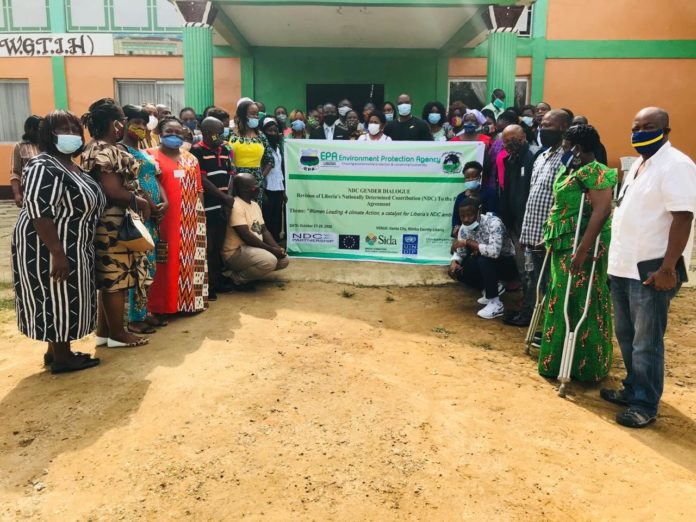By Calvin Quays|LPR News, Ganta
Climate change has shifted the odds and changed the natural limits with women being extremely vulnerable to its effects in Liberia.
Considering that it could exacerbate existing gender disparities in the country, Liberia Environmental Protection Agency (EPA) and the United Nations Development Program (UNDP) have embarked on a process to include gender issues in the country’s Nationally Determined Contributions (NDC), currently being reviewed.
To enable a broad based and inclusive gender participation in the revision of the country’s NDCs, the EPA and UNDP on 28 October 2020 concluded a two-day national gender dialogue for the revision of Liberia’s NDC to the Paris Agreement in Ganta, Nimba County.
Bankrolled by UNDP’s Climate Promise Initiative and the Swedish Development Cooperation Agency (SIDA), the dialogue focuses on incorporating gender inclusiveness in Liberia’s NDC aimed at meeting its emissions reduction targets in five sectors including the Energy, Forestry, Agriculture, Waste and Transport under the Paris Agreement with possible inclusion of other sectors that were omitted from the previous NDC.
The gathering attracted civil society groups promoting gender equality and women empowerment, gender coordinators from government ministries and agencies and the private sectors and community-based groups supporting women empowerment.
Speaking at the start of the dialogue, EPA Deputy Executive Director, Randall M. Dobayou said the dialogue was organized to include women in the revision process because women are vulnerable to climate change impacts compare to their male counterparts.
“We brought you here to take ownership, because anything that happens to the environment affects you the most; the environment is at risk. For example, our weather conditions have changed thereby affecting our rain pattern and that is because of climate change,” Mr. Dobayou said.
The EPA Deputy boss also stated that it is important for women to be included in the revision process because women are forceful in making sure that the right things are done in all aspects of their lives and as such joining the fight to combat climate change is critical.
Abraham S. Tumbey Jr., Programme Manager of the National Adaptation Plan (NAP) at UNDP, for his part disclosed that women commonly face greater risks and burdens from the impacts of climate change in situations of poverty.
He argues that the dialogue was necessary because women are hit the hardest by dramatic shifts in climate systems their mortality from climate-related disasters is higher than that of men.
Compared to men, Mr. Tumbey said women’s domestic burdens including the collection of firewood and water increased substantially with various manifestations of climate change.
“Any decline in land and biomass productivity as a result of climate change will therefore affect women more than men, especially in rural areas,” he said.
According to him, it is also harder for poor women than for poor men to recover their economic status and welfare in Liberia and indicated that “as such with climate change, development initiatives can affect male and female beneficiaries in vastly different ways because of these gender differences and inequalities.
“If gender dynamics are not specifically taken into account, women often encounter obstacles to participating in, and benefiting from development projects,” he explained.
For her part, EPA Gender Coordinator Josephine F. Doles lauded the women representatives for honoring the invitation to attend the dialogue.
Madam Doles said it is expected that women would take ownership of the NDC revision for effective implementation.
She also noted that it is expected that they will actively and equally engage men and other gender groups in the NDC actions and in decision making to help ensure an inclusive approach in national climate strategies and actions.
“We expect all participants to grasp this opportunity and work toward the fulfillment of both the NDC and the Paris Agreement, and most importantly towards more inclusive and sustainable development outcomes,” she noted.
As a signatory to the Paris Agreement reached in 2015, Liberia immediately committed herself to the process by producing her Intended Nationally Determined Contributions (INDC) with the ambition to reduce emission by -15%.
As ambitious as Liberia’s INDC is, it didn’t take into account gender inclusiveness, even though climate change affects women greatly.
In Liberia, climate change has a greater impact on women population because they are the group that mostly rely on natural resources for their livelihoods and or have the least capacity to respond to natural hazards, such as landslides, floods and sea erosions.






















